Oct 2010
Kill or be killed in AMC's bitingly bloody Walking Dead
10/29/10 08:11 AM
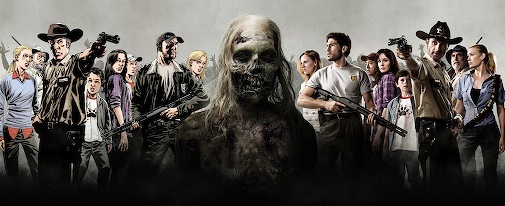
Premiering: Sunday, Oct. 31st at 9 p.m. (central) on AMC
Starring: Andrew Lincoln, Jon Bernthal, Sarah Wayne Callies, Laurie Holden, Steven Yeun, Jeffrey DeMunn, Chandler Riggs, Lennie James, Adrian Kali Turner
Produced by: Frank Darabont, Gale Anne Hurd
By ED BARK
"Bites kill ya. The fever burns ya out. But then after awhile, you come back."
There you have it. AMC's The Walking Dead, its fourth original series, takes Robert Kirkman's ongoing, same-named comic book series to the extreme limits of advertiser-supported television. Not sexually, but violently. A "zombie apocalypse" is not for the faint of heart. And Halloween night's 90-minute premiere is replete with kill shots to exploding, decomposing heads. A bullet to the brain is the only way to take a zombie out. And there are thousands of them roaming the ravaged landscapes of The Walking Dead.
How did it come to this? Well, it just did. Viewers of AMC's adaptation and readers of Kirkman's comic books simply have to accept the premise and buy into an aftermath that pits gaggles of survivors against hordes of flesh-eating zombies. It's kind of like the Democrats vs. the Republicans. Only tamer.
The star survivor is small town Georgia sheriff's deputy Rick Grimes (Andrew Lincoln). In an early scene, Grimes and partner Shane Walsh (Jon Bernthal) commiserate at length about the women in their lives.
Anyone with a "pair of boobs" knows nothing but the 'On' switch when it comes to conserving energy, Walsh grouses. On the other hand, "this same chick, she'll bitch about global warming."
Grimes' concerns run deeper. Lately, his wife Lori (Sarah Wayne Callies), is angry at him all the time. Recently, in front of their son, Carl (Chandler Riggs), she even wondered if "he cares about us at all." A man would never say something that cruel, Grimes contends, apparently living in a dream world that soon will become a nightmare. (File this conversation away because it has a bearing on future developments.)
The Grimes-Walsh repartee is interrupted by a police call. Some bad guys are on the loose and Grimes ends up on the receiving end of two slugs that put him in a prolonged coma. He awakens to find his hospital and its surroundings infested by zombies and assorted rotting corpses. And so the meat of the story begins, with Grimes spending considerable time on screen as Walking Dead's only fully functioning character before he finally breaks down and cries.
This is powerful if initially perplexing stuff, with Grimes eventually encountering a surviving man and his young son. Former Jericho co-star Lennie James is terrific as Morgan, whose wife has been bitten and is now among the ravenous walking dead. Survivors have been told to go to Atlanta, site of the Centers for Disease Control. But Morgan still can't bring himself to go -- nor to put a slug in his wife's brain to end her misery.
There are some hugely impressive money-on-the screen images here -- and also a gut-wrenching sequence in which Grimes and Morgan separately make life or death decisions -- death being an operative word.
Walking Dead's imposing production values are underscored by panoramic shots of Grimes riding into Atlanta on a surviving horse before encountering a mega-swarm of zombies. He's in extreme jeopardy as Sunday's 90-minute pilot episode signs off with a stunning overhead shot.
Episode 2, one of six initially ordered by AMC, is demonstrably smaller in scope but no less graphic. It puts Grimes in close quarters with a small group of fellow survivors who periodically venture into Atlanta in search of life-preserving provisions. It's probably best not to watch on a full stomach, given the means by which Grimes and young Glenn (Steven Yeun) try to escape a department store besieged by flesh-eaters.
Walking Dead risks being a one-note survival of the fittest gore extravaganza. But character development and other intriguing plot twists are coming soon, at least in terms of what's already transpired in the comic books since Kirkman birthed them in 2003.
In just the past four years, AMC has reinvented itself as the Emmy-winning network of Mad Men, Breaking Bad and Rubicon rather than the place where movies are aggravatingly interrupted by commercials. Walking Dead is another very ambitious and provocative series. Let's see if it has legs. At the very least, it's got a lock on the Emmy for makeup.
GRADE: B+
Syfy's Hollywood Treasure a nook for schnooks who collect (including Uncle B)
10/27/10 10:00 AM
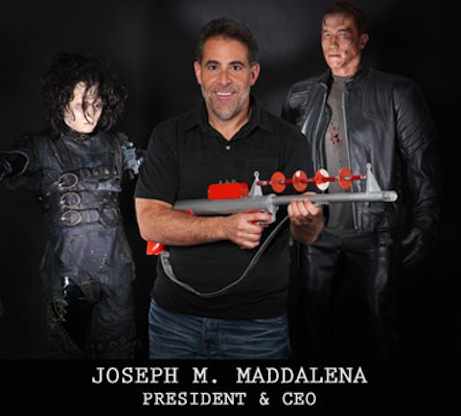
Premiering: Wednesday, Oct. 27th at 9 p.m. (central) on Syfy with back-to-back half-hour episodes
Starring: Joe Maddalena, Brian Chanes, Jon Mankuta, Tracey McCall
Produced by: Jerry Shevick, Mark Zupon, Bruce Toms
By ED BARK
Everything -- and everyone -- has its price. But who would cough up $70 grand for a Lost In Space laser rifle?
That's the only final auction bid I'll reveal in the interest of encouraging viewers who might have a Pez dispenser once used as a kid by Jerry Van Dyke. There's always a buyer out there somewhere.
Syfy's passably informative and entertaining Hollywood Treasure launches Wednesday with two half-hour episodes opposite Game 1 of the World Series. It's worth recording if you're a fan of Antiques Roadshow or The Price Is Right -- or have a prop from Nurse Betty.
The show's leading man is Joe Maddalena, a rather excitable sort who owns a Hollywood auction house called Profiles In History. Joe's "never-ending quest" is to hunt down collectibles and sell them for big money. He's always thrilled to get good prices for the previous owners, but never says what his cut is. Side note: Joe's company conducted the recent auction of Lost memorabilia.
In Wednesday's second episode, Joe braves a flight to Toledo, Ohio, where a misty-eyed collector named Sue Palmer has owned the wicked witch's hat from The Wizard of Oz since paying $30 grand for it 21 years ago.
"Owning that piece has been like owning a piece of history," she deduces. Joe's all smiles but his heart is pounding like a construction site jackhammer. If he can persuade her to part with it, his upcoming auction will have its crown jewel.
Each half-hour begins with a "10 Days Until Auction" countdown and climaxes with a few minutes from the auction itself. It's Joe and his team's responsibility to gather enough enticing goodies to make bidders go nuts. They're initially on the trail of a possible shark from Jaws that now resides at the U-Pick Parts junkyard. But their biggest prey is a carpet handbag whose Chicago owners say was used by Julie Andrews in Mary Poppins.
Even at a half-hour, the episodes are padded. Commercial breaks apparently are deemed too long for viewers to remember what happened just a few minutes earlier. So Hollywood Treasure needlessly repeats some of the scenes and dialogue.
There are plusses, too. It's interesting to watch the authentication of a coat supposedly worn by Bela Lugosi in White Zombie. There's also a visit to the home of Joe's friend, Dawn Wells, who played Mary Ann on Gilligan's Island. She's saved a lot of stuff, including a pair of her short shorts, a checked dress, a coconut prop and some scripts signed by the whole cast. Joe salivates, but encourages Dawn to wait a bit to capitalize on the "sizzle" of a planned 2011Gilligan's Island feature film that supposedly will star the likes of Zach Braff, Jack Black and Emma Watson as Mary Ann.
Syfy publicity materials say that items up for bid in future episodes will include a miniature biplane from the original King Kong movie and the bottle from which Barbara Eden emerged on I Dream of Jeannie.
Eden, who owns this artifact, plays hard to get and is unseen in the first two episodes of Hollywood Treasure. But she apparently will be playing along at some point.
Meanwhile, check out your garage or attic to see if you might have a mint condition copy of William Shatner's The Transformed Man LP or some teeth kicked in by Chuck Norris on Walker, Texas Ranger. Whatever they're worth, someone will pay it.
GRADE: C+
PROGRAMMING NOTE: Viewers who subscribe to DirecTV can see the fifth and final season premiere of Austin-made Friday Night Lights before it eventually makes its way to NBC in late spring or early summer.
FNL relaunches on Wednesday, Oct. 27th at 8 p.m. (central) with an episode titled "Expectations." Kyle Chandler and Connie Britton return as the series' bulwarks, Coach Eric Taylor and his wife, Tami Taylor. Both received overdue Emmy nominations for their work in Season 4.
PBS gets cracking with splendid new Holmes in Sherlock
10/22/10 04:03 PM
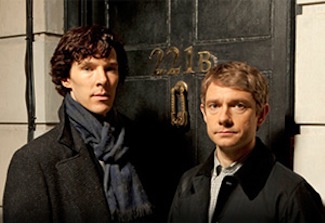

By ED BARK
This time around Sherlock Holmes has his own popular website. And his playground is in present-day London, where the cocksure detective's hunches, deductions and brain storms on paper might seem antiquated amid all the forensic advances.
No worries, though. PBS' Sherlock, airing under the Masterpiece Mystery banner for the next three Sunday nights, is a bouncy and crackling good "re-imagining" of the Baker Street sleuth and his at times reluctant partner, Dr. John Watson.
In this version, Watson (Martin Freeman) is recently returned from Afghanistan, where he was wounded in combat. He relies on a cane, has recurring nightmares and is looking for a roommate. A matchmaker of sorts sets him up with Holmes and his open-minded landlady, Mrs. Hudson (Una Stubbs). The address is still 221B Baker Street, the Sherlock abode ever since Sir Arthur Conan Doyle first put him into action in the late 1800s.
Holmes (Benedict Cumberbatch) is first seen whipping a corpse in a morgue with a riding crop to raise some bruises in hopes of determining the time of death. He seems to have a little bit too good of a time doing it. But this is a guy with both an other-wordly air about him and the unbridled nerve to exclaim, "Four serial suicides, and now a note. Ah, it's Christmas!"
The first case is subtitled "A Study In Pink." which unfolds in 90 minutes time on Oct. 24th at 8 p.m. (central) on KERA/13 in D-FW. The next two chapters, on Oct. 31st and Nov. 7th, go by the names of "The Blind Baker" and "The Great Game."
The prime-time terrain is just about choked with crime-solving dramas. Still, Sherlock producers Steven Moffat and Mark Gatiss (who also deftly plays the mysterious Mycroft) find some novel ways to twist and turn Sunday's opening yarn. It turns out that the four deaths in short order weren't self-induced as Holmes initially thought. This only makes it all the better.
"We've got ourselves a serial killer," he exudes. "I love those. There's always something to look forward to."
Cumberbatch, a reed-thin actor with a sharply triangular face, plays Holmes as a mile-a-minute talker whose riffs sometimes can be a bit hard to lasso. But he does enunciate well. And the banter between Holmes and Watson is frosting on this cake. Which of course, it must be.
Sherlock can be very serious-minded as well. A climactic cat 'n' mouse faceoff between Holmes and the killer is superbly played and full of revelations about what makes both of them tick.
Freeman likewise is very good as Watson, particularly during a prolonged give-and-take with Mycroft in which the latter seeks to bribe him.
Sherlock co-stars Rupert Graves as detective inspector Lestrade, who invariably turns to the mercurial Holmes when a case stumps his force. There's also the very snide Sgt. Sally Donovan (Vinette Robinson), who's convinced that Holmes is a "psychopath" destined to be a killer himself someday if he becomes too bored.
"I'm a high-functioning sociopath," Holmes snaps at another cop. "Do your research."
Do yourself a favor and give this latest depiction of Sherlock Holmes a spot in your TV viewing regimen. But wait in vain for him to say "Elementary, my Dear Watson." They don't know each other quite well enough for that yet. But maybe it'll happen sometime during their next two adventures.
GRADE: A
NPR's dopey dismissal of Williams is worthy of a dunce cap
10/22/10 09:14 AM
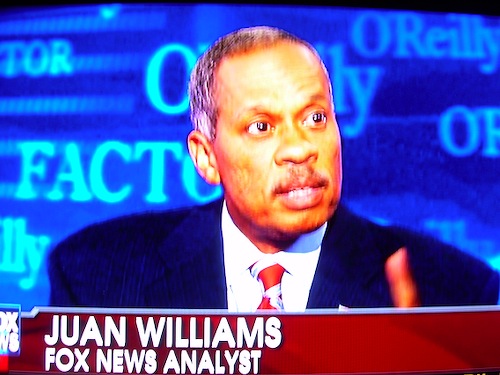
By ED BARK
Way to go, NPR. You've managed to re-jeopardize your taxpayer funding, given Fox News Channel a pick ax to swing at you and even gotten on the wrong sides of the women of The View.
That's a tough trifecta to pull off, particularly the last part. But the ill-considered, knee-jerk firing of longtime NPR analyst Juan Williams, who dared to express a feeling on FNC's The O'Reilly Factor, casts NPR in an immensely bad light. Outside of MSNBC's Keith Olbermann and Rachel Maddow, few have come to the defense of a decision that makes one of radio's erstwhile shining lights look like a petty, partisan tyrant. Even NPR's ombudsman, Alicia Shepard, wrote that a "more deliberative approach might have enabled NPR to avoid what has turned into a public relations nightmare." Maybe she'll be sacked, too.
Until Wednesday's abrupt dismissal, Williams had worked at NPR for the past 10 years while also regularly appearing on FNC and Fox News Sunday as a representative of the liberal point of view. On Monday night's edition of O'Reilly's Factor, Williams said he's no bigot, but did admit to feeling "nervous" when boarding a plane whose passengers also included people in "Muslim garb."
He didn't say that everyone should feel that way, although countless air travelers likely do. O'Reilly baited the hook by speaking of a "Muslim dilemma" in the United States before asking Williams, "Where am I going wrong?"
Williams then let his gut feelings be known, but also added, "We don't want, in America, people to have their rights violated, to be attacked because they hear rhetoric from Bill O'Reilly and they act crazy."
For this he was fired by NPR president Vivian Schiller, who said in a memo to member stations that "news analysts" (employed by NPR) may not take personal public positions on controversial issues; doing so undermines their credibility as analysts, and that's what's happened in this situation." (And here I thought analysts were supposed to have opinions.)
Schiller added that Williams had "continued to violate this principal" over several years "despite many conversations and warnings." Schiller also said that NPR management was "profoundly sorry that this happened during fundraising week." (Wait, isn't every week fundraising week at NPR?).
In subsequent remarks Thursday to the Atlanta Press Club, Schiller ridiculed Williams by saying that "whatever feelings Williams has about Muslims should between him and his psychiatrist or his publicist." She later apologized for "my thoughtless remark." (Sorry, Vivian, but that was an opinion. You're fired!)
Williams is hardly heading to the poor house. FNC immediately signed him to an extended three-year deal reportedly worth $2 million. And during his appearance with O'Reilly on Thursday night, the host noted that Williams will be the show's fill-in host Friday night.
In a very bluntly worded blog posted Thursday on foxnews.com, Williams said that his comments to O'Reilly on Monday night's program "are being distorted by the self-righteous ideological, left-wing leadership at NPR. They are taking bits and pieces of what I said to go after me for daring to have a conversation with leading conservative thinkers. They loathe the fact that I appear on Fox News."
Williams also noted that he was the "only black male on the air" at NPR. "This is evidence of one-party rule and one-sided thinking at NPR that leads to enforced ideology, speech and writing. It leads to people, especially journalists, being sent to the gulag for raising the wrong questions and displaying independence of thought."
Let's be honest. Williams would have been in no trouble at all had he offered this opinion on MSNBC: "As an open-minded journalist, it comforts me to get on a plane whose passengers include Osama bin Laden lookalikes. We all need to get past 9/11 and understand that terrorists come in all shapes, sizes and faiths."
Instead Williams picked the wrong network to express what in reality was his feeling, not his opinion. And now, of course, Fox News Channel is taking this to the bank, joyously calling for an end to taxpayer-funding of NPR.
Whatever rhetoric it chooses to explain its decision, NPR and its clumsy leadership now wear undeniable ideological overcoats of their own. Fox News Channel has been right of center since its inception, with "Fair and Balanced" a hollower come-on than "Jumbo Shrimp." NPR and MSNBC are kindred spirits on the left, no matter what slogans they flaunt.
No one in their right -- or left -- mind should believe otherwise. At least that's my opinion. And here at unclebarky.com, I can say that without fear of being fired. It's the overriding good thing about being your own boss. Williams has his $2 million consolation prize and your friendly content provider to date this month has made $37.59 in amazon.com commissions from readers who generously click on the unclebarky.com ads before making their purchases.
Thanks for that. It's the price of independence.
NBC News draws the line on election night by separating itself from partisan MSNBC and expanding coverage into late night hours
10/21/10 01:42 PM
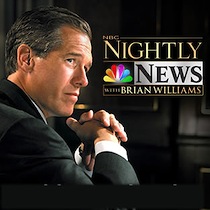
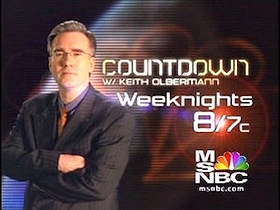
By ED BARK
NBC News isn't about to acknowledge this publicly.
But Thursday's "unprecedented" decision to expand its Nov. 2nd mid-term election coverage into late night hours seems like an obvious way to keep both Brian Williams and Tom Brokaw away from an increasingly partisan MSNBC. It's a clear line of demarcation between a broadcast network news division that still touts its objectivity and a cable sister whose new "Lean Forward" promotional campaign is aimed directly at the conservative Fox News Channel.
Williams, the NBC Nightly News anchor, and Brokaw, his predecessor, have crossed over to MSNBC during previous big political events. That's largely because they had no place else to go once NBC News ended its coverage.
But MSNBC increasingly has become an uncomfortable spot to be in -- at least during nighttime hours -- if you're otherwise intent on presenting the news in a reasonably unbiased manner. The recent debut of Lawrence O'Donnell's 9 p.m. (central) program gives MSNBC a quartet of avowedly left-of-center hosts, with Ed Schultz, Keith Olbermann and Rachel Maddow the incumbents. Hardball maestro Chris Matthews is somewhat more even-handed, but not so much lately.
On election night at least, there apparently will be scant mixing and matching. NBC is preempting both The Tonight Show with Jay Leno and Late Night with Jimmy Fallon to give Williams, Brokaw and others a home of their own. They'll be joined by Meet the Press moderator David Gregory, correspondents Andrea Mitchell and Savannah Guthrie, and Washington Bureau chief Mark Whitaker.
According to the NBC News publicity release, just two principal players will be crossing over. Political director/chief White House correspondent Chuck Todd and utility news anchor Lester Holt will be dividing their time between NBC and MSNBC.
MSNBC's all-night election night coverage otherwise will be unto itself, with Matthews, Olbermann, Maddow, O'Donnell, Schultz and contributor Eugene Robinson at the helm.
During the mid-summer TV network "press tour" in Beverly Hills, MSNBC president Phil Griffin was asked by unclebarky.com whether viewers are really well-served by polar opposite 24-hour news channels offering almost entirely different slants on just about every issue of import.
"We've carved out a place where we know there's a sensibility and there's an audience that likes it," he said in part. "And we've had a great deal of success, and we're proud of it."
O'Donnell added that "the audiences voted on this" and there are still "straight down the middle" presentations on both Nightly News and Jim Lehrer 's PBS NewsHour program.
"Do you want to imagine a world in which the Fox News Channel was doing what it was doing in prime-time and everybody else was doing something that was much closer to what Jim Lehrer does?" he asked. "What would that feel like? And what would it feel like to an audience that disagrees with Fox's angle?"
Given what MSNBC has become, it's becoming of the NBC broadcast news division to separate itself on a night when partisan rhetoric will be flying from candidates' camps while two opposing cable news networks again go to war. MSNBC may be the "Place For Politics," but it's well past being a comfortable home for either Williams or Brokaw. It's about time that all concerned realized that, and made other accommodations for them.
Frontline begins new season by re-lighting Texas arson execution in Death By Fire
10/19/10 05:41 PM
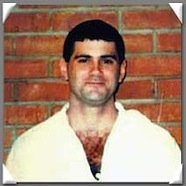
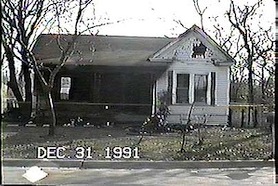
By ED BARK
The season premiere of PBS' long-running, much-honored Frontline documentary series has a strong Texas angle on a night when its timing is unfortunate.
Airing Tuesday, Oct. 19th at 9 p.m. (central) on KERA/Channel 13 in D-FW, it will be directly opposite a much bigger ongoing state story -- Game 4 of the ALCS between the Texas Rangers and New York Yankees.
Activating your recording device is recommended if you're not yet familiar with this almost two-decades old case. Whether Cameron Todd Willingham of Corsicana in fact set the Dec. 23, 1991 home fire that killed his three young daughters has been investigated and re-investigated before and after his Feb. 17, 2004 execution.
Prosecutors and law enforcement officials remain adamantly convinced that he did the deed. So does Willingham's defense attorney.
"He was an individual with essentially no redeeming values," says former prosecutor John Jackson. "This was his crowning achievement as a psycopath -- the murder of his three children."
But latter day experts with more tools at their disposal say there's no evidence at all to support the arson conviction.
"Fundamentally, this was a classic accidental fire," says forensic scientist Gerald Hurst. A 2009 report commissioned by the Texas Forensic Science Commission later backed him up, prompting Gov. Rick Perry to replace the commission's chairman.
Perry, who also refused to authorize a stay of execution back in 2004, typically bungles his explanation of his actions.
"He (Willingham) spews an obscenity-laced 'triad' (sic) against his wife" just hours before being executed, Perry says in previously televised remarks. "That's the person that we're talking about here . . . This was a bad man."
Frontline adopts a 48 Hours Mystery/Dateline motif in re-digging into the case. Except that this is PBS, so the presentation is much more meticulous and bereft of titillating mood music or over-played voice inflections. The narration instead is relentlessly sober and matter-of-fact, as it always is when PBS staple Will Lyman is doing the talking.
"Todd would have to change his ways," he says at one point. "He had a reputation as a ladies' man." Dateline's Keith Morrison, deliciously parodied by Saturday Night Live's Bill Hader, would add mustard, relish and tabasco to that passage. But Lyman offers no condiments, serving a steady diet of plain hamburgers well done. In this case, there's something to be said for that.
Death By Fire has a wide range of fresh interviews, not that most of these people haven't talked before about a man who lately has become something of a cause celebre for death penalty opponents. But any martyring of Cameron Todd Willingham is unsettling at best.
By virtually all accounts, he was a wife-beating, heavy-drinking shirker of family responsibilities. Some think that may have made him an easier target for investigators, prosecutors and the jury that eventually sent him to Huntsville's death row. But as the film notes, it's still no reason to execute an innocent man.
This is a solid, involving hour of television, even if it's also basically a regurgitation. Little if any new ground is broken here. And in the end, if you want my opinion, I just couldn't help thinking that this guy is about as innocent as O.J.
Knuckle-draggers who incessantly beat their wives in effect are playing with fire. So it's hard to argue that the world is a lesser place without the likes of Cameron Todd Willingham. Did he get what he deserved? Legally, that's very questionable. Viscerally -- well, that's another matter entirely.
GRADE: B+
Addendum: Here's video of a recent update on the Willingham case, with WFAA8's Jason Whitely doing the off-camera reporting/narration for the Dallas-based ABC station while Fox4's Richard Ray, CBS11's Bud Gillett and an NBC5 microphone can be seen as part of his story.
Sacrilegious? Glee now bigger than The Beatles (with an asterisk)
10/07/10 09:34 AM
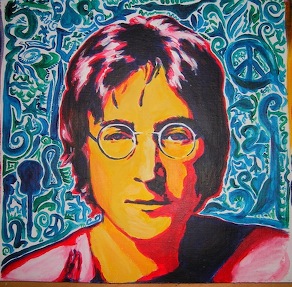

By ED BARK
John Lennon once got in considerable trouble for saying The Beatles had become more popular than Jesus.
Now Fox says that Glee has become more popular than The Beatles -- at least on the Billboard Hot 100 chart.
Early in its second season, Glee already has landed 75 singles on the Hot 100, including six new entries this week. That breaks The Beatles' previous "non-solo act" record of 71.
The Glee cast of course is cheating a bit by covering a wide range of previous chart-toppers, including Tuesday's performance of The Beatles' "I Want to Hold Your Hand" by cast member Chris Colfer. The Beatles, as some might recall, wrote their own songs.
Glee also ranks No. 3 among all Hot 100 listers, behind only Elvis Presley (108) and James Brown (91). So it's only a matter of time before they fall, too.
Billboard began the Hot 100 list in 1958. Fox says that Glee has sold 11.5 million downloads and 2.8 million CDs since its May 19, 2009 premiere.
Shedding new light on Springsteen's Darkness in superb HBO reprise
10/06/10 01:04 PM
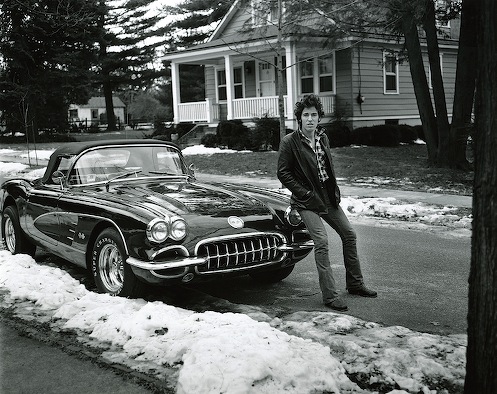
By ED BARK
On the heels of PBS' Michael Feinstein's American Songbook comes HBO's kindred The Promise: The Making of 'Darkness on the Edge of Town'.
They couldn't be much more dissimilar musically. But both of these thoroughly interesting enterprises share a passion for how compositions come together -- and how different they might have been.
HBO's 90-minute film premieres on Thursday, Oct. 7th at 8 p.m. (central) and will be repeated throughout the month. It melds current-day recollections with newly discovered footage, circa 1976-'78, of Bruce Springsteen and the E Street Band rehearsing, recording and struggling to make a totally different album from 1975's breakout smash, Born to Run. But Darkness wouldn't be released until 1978.
Litigation between Springsteen and his manager at the time, Mike Appel, had preempted an immediate return to the studio to capitalize on the extraordinary momentum built by Run. Springsteen wanted to do the followup album his way, but Appel still had final say on the finished product. So who was going to be in control? "Early on I decided it was going to be me," Springsteen recalls while emitting a slight chuckle.
Springsteen and Appel, who also recalls those times in a new interview, eventually reached an accommodation after having dinner together. They remain on speaking terms today. But back then, "You're fighting a friend," Springsteen says. "I wish it on nobody. The loss of Mike's friendship was a tremendous loss."
Jon Landau, who co-produced the "wall of sound" masterpiece that Run became, initially anticipated doing more of the same with the band's fourth album. But Springsteen had become determined to shift into reverse and record a leaner, far less ornate album that would harken back to his hardscrabble upbringing while virtually renouncing his newfound fame.
"I had to disregard my own mutation," Springsteen remembers. "That was the cloud of success."
"We didn't want any sweetening. We wanted the coffee black," Landau says after the two reached the same conclusion.
None of this sounds pretentious in the context of a film that is partly about what might have been had Springsteen yielded a bit more to his commercial instincts. Two Springsteen-written songs that quickly became big singles for others -- "Because the Night" (Patti Smith) and "Fire" (The Pointer Sisters) -- could have been a part of the Darkness playlist. In fact he wrote about 70 potential tracks for the album, with only 10 making the final cut.
"I had like a big junkyard of stuff as the year went by," Springsteen says.
But a new and much-expanded Darkness boxed set, due to be released on Nov. 16th, will include Springsteen's original takes of both "Because the Night" and "Fire."
Lead guitarist Stevie Van Zandt, (also Silvio from The Sopranos) can be seen in two vintage duets with Springsteen during the from-the-vault footage. They're infectious and speak to Springsteen's potential as a juke box hero. But that wasn't the way he wanted to rock -- or roll.
"It's a bit tragic in a way," a latter day Van Zandt laments. "Because he would have been one of the great pop songwriters of all time . . . A lot of our 'poppier' stuff" didn't make it to vinyl.
The more than 30-year-old footage, of rehearsals in both the studio and Springsteen's home, harkens to times when the music was all that mattered no matter how long it took.
"We were messianic in our approach . . . It was both self-indulgent and the only way we knew how to do it," Springsteen recalls.
Still, they just couldn't get the sound down, until a novice mixer named Chuck Plotkin arrived with an ear for distilling the music to its bare essentials.
"He understood how to build a sound picture," says Springsteen, who praises Plotkin as "the white knight on that record."
It's an altogether terrific film -- and filmed record. A band and its visionary leader finally carried the day. In retrospect, maybe they didn't make the absolute best album they could have made. But it no doubt is the one that Springsteen had to make at the time.
GRADE: A
Michael Feinstein's American Songbook is chapter and verse on crooner/collector
10/06/10 08:16 AM
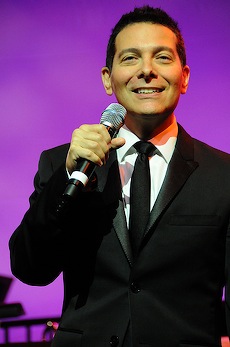
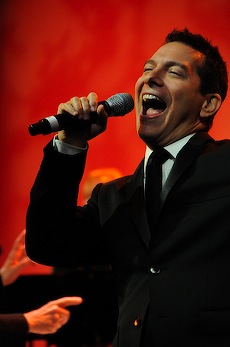
By ED BARK
Vocalist/pianist by night, collector/hoarder by day, here's a guy who knows what he likes.
Michael Feinstein worships the kind of music that never goes out of fashion but almost assuredly will never be fully fashionable again. In other words, it's hard to imagine someone downloading "Alexander's Ragtime Band" on itunes.
PBS remains the cardigan sweater of TV networks, though. And that's a very good thing when it comes to the three-part, three-hour Michael Feinstein's American Songbook. It premieres on Wednesday, Oct. 6th at 7 p.m. (central) and continues at the same hour on Oct. 13th and 20. (KERA/Channel 13 is the carrier in D-FW).
The program is a showcase for Feinstein's considerable talents and a testament to his persistence in preserving and re-recording tunes that otherwise might never be heard again. Discovering alternative lyrics to "There's No Business Like Show Business" and singing them with gusto is the kind of thing that sends Feinstein over the moon. He can't disguise his contempt for all the material that has been destroyed due to "the ignorance of people in charge."
Wednesday's first hour, subtitled "Putting on the Tailfins," finds Feinstein onstage, at an Indiana flea market and knowledgeably dissecting performances from the likes of Frank Sinatra (whom he adores) and Rosemary Clooney (whom he adores even more). Composers George and Ira Gershwin also are gods to him. As a younger man, Feinstein regularly visited lyricist Ira, cheering the old man with his intricate knowledge of music from another era.
"I believe he lives in a different world," says his associate and live-in partner Terrence Flannery.
Feinstein's parents, with whom he still seems to have a somewhat prickly relationship, say he was a perfectionist even as a little boy. Kids who came over to the house to play Monopoly were told to go home if they didn't play it Michael's way, his mother, Mazia recalls in next Wednesday's Hour 2 ("Best Band in the Land").
But she doesn't say this with any rancor. Feinstein may be persnickety and single-minded, but his overall net worth to society is off the charts. Whether performing the standards he loves (in about 150 shows per year) or rescuing the music of bygone times, he's a crooner/curator of considerable value. Who but Feinstein would have dug up Margaret Whiting's performance of "One Hour With You" from the World War II era and then played it for her in her home? She's touched, he's beaming and all seems right with the world.
Feinstein also documents the travails of black musicians and the sad irony of Harlem's segregated Cotton Club, where whites went to hear black music while blacks were denied admission. In Hour 3 ("A New Step Every Day"), he even makes a persuasive case for Al Jolson being an early version of Elvis Presley. Their hip gyrations were virtually identical, says Feinstein, who also notes that Jolson reveled in being a very sexual performer and lady killer. A vintage clip pretty much bears this out.
There's also a visit with Joe Franklin, the seemingly eternal New York City TV/radio interviewer whose storage areas are land-filled with stuff collected and strewn about. Even Feinstein looks a bit overwhelmed, but of course appreciates the value of being able to dig for buried treasure. An ancient piece of sheet music still makes his heart go pitter-pat -- as does a dusty tape of a onetime radio performance that otherwise would be forever silenced.
Feinstein's passions are fully communicated throughout these three hours. And each of them fittingly ends with his full-length performance of an old chestnut. At age 54, he's still vigorous of voice and messianic about recapturing and preserving the music that keeps him humming.
There are far worse things to do with one's life. And at least he's not a dedicated devotee of The Bay City Rollers.
GRADE: A
HDNET's Drinking Made Easy hopes to make some viewers fall hard
10/05/10 12:09 PM
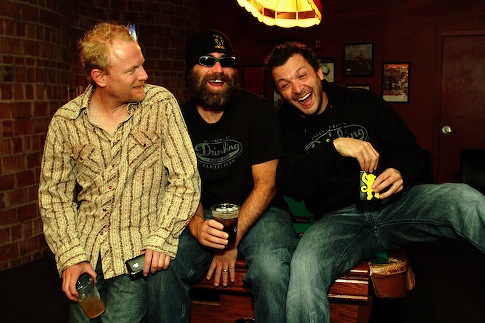
Premiering: Wed., Oct. 6th at 7:30 p.m. (central) on HDNet
Starring: Zane Lamprey, Steve McKenna, Marc Ryan
Produced by: Zane Lamprey
By ED BARK
It's probably far better to be sloshed, plastered, pounded, hammered, three sheets to the wind or on all fours under the table to fully grasp the entertainment value of Drinking Made Easy.
Alas, I was only caffeinated while screening this latest original series from Dallas-based HDNet. Launching Wednesday, it's getting a full-blown 24-episode run through a wide variety of America's watering holes.
The concept is similar to Guy Fieri's Diners, Drive-ins and Dives, with a little Man v. Food thrown in when sidekick Steve McKenna fails to conquer a plate of 144 tater tots. He ends up upchucking a portion of it after being goaded into chugging an industrial-sized mug of beer. Perhaps your sides aren't splitting yet.
Episode 1 takes McKenna, host Zane Lamprey and fellow imbiber Marc Ryan on a careening tour through Arizona. Things start fairly promisingly with Lamprey's visit to an "illegal moonshiner" who wears a kerchief and sunglasses to disguise himself after the host arrives and departs with a pillowcase over his head.
"You allegedly made that?" Lamprey asks after sampling a shot.
"I allegedly made that."
"I allegedly like that."
That's funny enough for starters, but Drinking Made Easy later begins to groan under the weight of two failed bits. In a dull interlude, the boys play miniature golf, which each of the losers required to buy the victor a half-dozen six-packs as part of the show's weekly "Six Six-Pack Challenge."
Later on, in a not-so-big finish, they arrive in black cowboy garb at Tombstone's Big-Nosed Kate Saloon, where two of the three feign collapsing from too much alcohol before Lamprey has a showdown with Pleepleus the Monkey. Viewers are encouraged to have a drink whenever he's sighted on the show.
Lamprey is an amiable enough host who likes to screw around while helping to make offbeat drinks before drinking them. His encounters with bartenders at Aunt Chilada's and the Martini Ranch are at least moderately entertaining. But this opening episode is wildly hit and miss, sort of like a drunk who thinks he's high-larious while scatter-shooting at a urinal.
Press materials for Drinking Made Easy quote HDNet owner Mark Cuban extolling Lamprey as a "perfect fit for the HDNet audience." He's also the author of Three Sheets: 6 Continents, 15 Countries, 190 Drinks and 1 Mean Hangover and has been dubbed "the Indiana Jones of drinking" by someone who must have been under the influence.
That might well make him a veritable Ernest Hemingway among HDNet's target audience of hard-partying young males too young to remember Jimmy Carter, Johnny Winter or Pabst Blue Ribbon.
GRADE: C-minus
Curtis couldn't quite manage any Tony awards on TV
10/01/10 11:44 AM
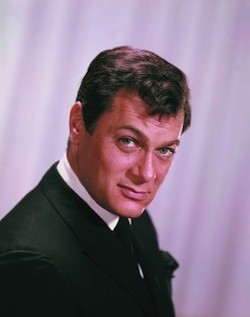
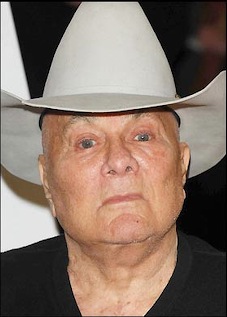
By ED BARK
The late Tony Curtis, who died Wednesday at age 85, didn't have much of a TV career. He turned to the tube only after his estimable big-screen career began fizzling. But despite ABC's considerable promotional effort, 1971's The Persuaders failed to make much of a mark, even with the added presence of co-star Roger Moore.
Curtis also played a Robin Hood-ish con man on NBC in 1975's short-lived McCoy before returning to ABC in 1978 as the recurring character Philip Roth in Robert Urich's Vega$.
His made-for-TV movie credits included Agatha Christie's Murder In Three Acts, The Count of Monte Cristo, Portrait of a Showgirl, The Users, Moviola: The Scarlett O'Hara War and Mafia Princess.
Persuaders was supposed to be the big one, though. Curtis and Moore played adversarial, crime-tackling playboys in this Europe-set series, which was produced in England. Curtis, in the role of Danny Wilde, was a Brooklyn-bred, self-made millionaire. Moore, as Lord Brett Sinclair, grew up in the lap of luxury.
The below clip, from the series' first episode, pits the two of them in a car chase through Monte Carlo. Its split-screen techniques and accompanying sappy road music ("Gotta get away -- he-y-y-y") are distinctly from those times. Still, it's all oddly watchable, with the final destination a posh hotel where Curtis and Moore vie to get their luggage handled first.
Enjoy the ride. And safe travels to the beyond, TC.
